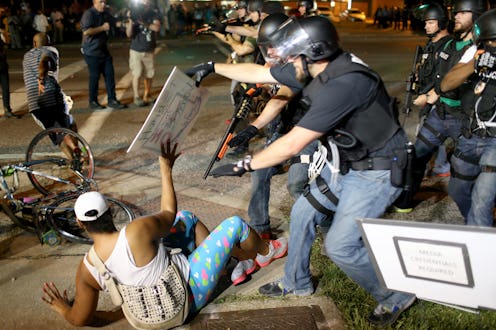News
No Matter What, Ferguson Changed Things
Rodney King, Oscar Grant, and Michael Brown have become some of the most highly-publicized cases of police officers using force against civilians. But what about Danny Rodriguez, Javier Ovando, and Kelly Thomas? These are just some of the names that have faded into the history of what some consider rampant police brutality in the U.S. And regardless of Ferguson's grand jury dropping charges against Darren Wilson, the high-profile nature of Officer Wilson's shooting of Brown won't leave the public's consciousness anytime soon — revealing that, no matter what, the events of Ferguson have changed the way the public scrutinizes police action against citizens.
The law, including juries who have the power to indict officers, overwhelmingly sides with police. But though we've been taught to assume that police officers are protected against lawsuits while on the job, Ferguson showed a view of the force outside of the infallible buddy cops that we once knew. It isn't a shift toward resentment of police forces, but a much-needed spotlight on cops that we've never had before.
Protestors brought people from all over the world right into the streets with them. Social media became an integral part of the protest, painting a picture of what happened in the aftermath of Brown's shooting for people who had never stepped foot in Missouri. We heard accounts of city officials and state legislators being arrested on social media. We saw the tear gas. In a way, the world was at the scene.
We've opened up communication channels for these incidents in a whole new way. Previously, many cases of officer shootings or beatings were contained regionally, but everyone knew what was happening in Ferguson, a St. Louis suburb that most people couldn't pick out on a map. Protests waged on after Oscar Grant was killed in Oakland, California in 2009, but with nascent social media activism there wasn't widespread national outrage or awareness, perhaps, until Fruitvale Station came out years later.
This isn't a call against cops. It isn't a systematic categorization of all law enforcement as trigger-happy goons. There have been too many cases preceding Michael Brown's that have faded before they ever reached the national spotlight. That doesn't need to happen anymore, and it won't. In the last two weeks, the nation heard about the case of 12-year-old boy in Cleveland, Tamir Rice, shot and killed by a cop — a grand jury will now decide whether the officer will be charged — and the Brooklyn man, Akai Gurley, "accidentally" shot and killed by the NYPD, a case that has now been ruled a homicide. Before Ferguson, who could say whether we'd have heard of these tragedies?
Cops, like lawmakers, are not exempt from their actions. People have the right to understand the details about cases like Brown's, not that the officials in Ferguson made that easy to ascertain. But social media can capture citizens' accounts of how paid public officials are conducting themselves with protestors and unarmed citizens. The kind of awareness raised throughout Ferguson protests has taught us one crucial thing: We have power, too.
Images: Getty Images
